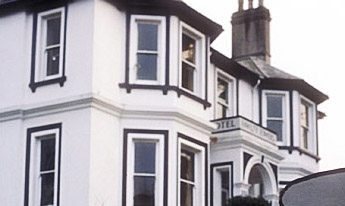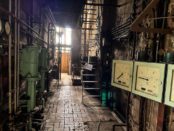The melancholic experience of visiting a declining English hotel out of season reveals some suggestivaly ominous parallels with the current state of the nation.
After almost forty years, John Cleese and Connie Booth's incredibly successful sitcom still has a way of forcing itself into relevance with the present day… particularly when staying in the South West of England.
Since the series first aired in the mid 1970s there have been several other sitcoms that have made an impact on the popular psyche: Yes Minister and Yes Prime Minister, The Young Ones, The Thick of It, The Office and others have all revealed something about the country. The best of these are already or become later comedic documentaries. It can be easy and even cheap to make parallels between current reality and these old shows but there are times when they are so glaring that it's impossible not to do so, particularly on a pre-Christmas break in a seen better times resort (not Torquay).
In some senses the hotel was incidental: simply a comfortable, decently-priced base for walking the spectacular and rapidly eroding coastal path. However, faced with long winter evenings and a not particularly inviting array of nightlife, the hotel assumes a greater significance in the stay than it might otherwise have done. It's a “Grand” late nineteenth century hotel on a hill overlooking a beautiful bay and the view from the front of the hotel can't be faulted.
it's hard to see how the dark, cramped corridors could ever have seemed other than depressing
Perhaps when originally built at the height of imperial grandeur, everything was “just so” and smoothly running, although it's hard to see how the dark, cramped corridors could ever have seemed other than depressing. The room is cosy and defies the stereotype of such establishments by being well-heated: fanatically well-heated in fact. Rather than being damp and draughty in the way that continental Europeans associate with England, it's so extremely hot that it becomes impossible to sleep.
This typifies contemporary responses to problems in this country, the widespread practice of going directly from one extreme to another bypassing all moderation or common sense: “if in doubt, over-compensate.”This is one of numerous daily examples where the supposed traditional English values of common sense and moderation might usefully be applied. It's all the more striking that to find such excessive heating precisely at a time of record energy costs and a declining economy.
Of course, anyone who travels regularly by bus in London can experience a similar syndrome. As in many buildings the novelty of air-conditioning has been embraced so zealously that it's always set to pneumonia-inducing maximum when used. It's either on or off: setting an appropriate temperature on a scale is beyond the wit or the will of most operators of such machinery.
London Buses are a special case however. It's not simply that they either have aggressive heating or aggressive air-conditioning, it's that you can experience the heating every summer and the air conditioning every winter, without fail. If you can get an answer from the driver as to why this should be, they'll tell you that they have no control and that it's all controlled centrally from the depot. Even if this is the case this means that someone at the depot regularly makes the decision to turn on the heating in midsummer or the air conditioning in midwinter. It would be nice to think that someone might be able to fix this issue in time for the Olympics, but even if they do it seems highly likely that abnormal service will be resumed soon afterwards.
the British Government's self-imposed obligation always to go with the lowest possible bidder
The combination of technical incompetence and organisational inflexibility is obvious everywhere, but particularly in the surreal microcosm of a hotel. In the episode The Builders, Basil attempts to save money by hiring Mr. O' Reilly's stereotypically cheap and cack-handed builders referred to by Manuel as the “Orelly Men.” With hindsight this turns out to have been a prophetic metaphor for the British Government's self-imposed obligation always to go with the lowest possible bidder, regardless of quality, a self-sabotaging edict on which “outsourcing” companies such as Capita have built their Empires.
Everywhere in the hotel there were signs that the Orelly Men's successors have been at work (of sorts). Turn on a bath tap and the shower drenches you. The bath sits absurdly in a tiled grotto complete with an entrance arch and a high rim that has surely caused a few accidents. The ridiculous “Leisure Club” carved out of the basement contains a pool that's crowded with four people in it and a gym attended by townie locals happily working out to moronic pop and giving the eye to any female guests who have the temerity to cross their field of vision. The shallow, narrow pool is so assiduously chlorinated that you can smell it on the second floor. Here the mythical “elf n safetea” has doubtless had a hand, but again the over-compensation syndrome is at work. If in the past they may have under-chlorinated they're now going to chlorinate like there's no tomorrow.
a pool that's crowded with four people in it and a gym attended by townie locals happily working out to moronic pop
Of course to fix all this would require architects, project managers and builders. Just like many British public and private infrastructure projects it will doubtless involve cost overruns, delays and introduce as many problems as it fixes. Places like this are a good corrective to the myth of standards in the private sector being inherently superior. Here there are no bungling bureaucrats to blame, only cost-cutting, bored managers and Orelly men on the take. Rather than a resident Fawlty figure there are a transient succession of disinterested staff employed by some offshore concern. In any case, the “public private partnership” ethos that shapes the market state is now so engrained that to claim any clear separation between public and private is an illusion. Civil servants become corporate servants and vice-versa and a bungling, kleptocratic private-public collaboration seeps down even to the lowest levels.
The centrepiece of the hotel is a beautifully-preserved 1970s-style “bar that time forgot”, only missing the Major awaiting his six o' clock G and T. The bar is watched over by a vaguely disappointed and improbably tall barman who probably had dreams of working in a prestigious English hotel but has ended up here. Surveying the spotless but dismal scene it would have been no surprise to encounter some left over Watney's Red Barrell or Barbican Alcohol Free Lager.
What they do offer is exactly the same selection of brands offered in every other drinking establishment in the town. There's no free market here, just a cosy local monopoly ensuring that neither locals nor visitors are ever challenged by anything too unfamiliar or pretentiously drinkable.
The town itself is a genteel disaster area, polarised between ossified heritage (a steam railway and League of Gentlemen-style local museum) and social decay (hyped-up seven year olds spending Friday night running between Subway and the CoOp harassing strangers and shop staff). Their elder siblings are in one of the pubs, some of which have a certain rustic charm but which already have a vaguely ominous air, even early in the evening. There's even a stray “cocktail” bar from a Spanish resort sitting amongst the 19th Century houses around the corner from the still operational and unspeakably bleak 1960s amusement arcade. With options like this, the quaint and cosy dysfunction of the hotel seems like the lesser evil.
Perhaps precisely because of the shadow that Fawlty Towers casts over the English hotel trade, the dominant attitude seems to be to combine the cosily familiar with the ineptly-executed new. The cuisine is self-consciously nouvelle, executed with none of the drama of Basil's Gourmet Night but little more of the finesse. As is so often the case now you pay more and get a pretentiously-named less. Yet while they might be able to muster vaguely contemporary and not inedible evening meals, serving breakfast to more than ten people simultaneously is more of a struggle.
Assuming you can bear to drink any of what's on offer you can retire to the lounge or to the draughty 1970s extension overlooking the sea: a great place to hear the torrential rain lashing against the windows and watch the wind force open the inexpertly fitted external door. Both areas are soundtracked with a militantly middlebrow selection of Cliff Richard live recordings, Procol Harum and Duke Ellington, which at least makes a surreal change from the more contemporary but equally bland and offensive sounds heard in many London pubs. Of course the (naively) utopian ideal would be to have a music-free area in which to lounge and read or stare at the sea but that would be too much against the spirit of the age.
past and present mingle promiscuously and the parallels become inescapable
The dated soundtrack and the 1970s-style ambience makes the lounge a strangely apt place in which to sit and read the papers' tales of the ongoing 1970s revival that's sweeping the nation (inflation, strikes, riots and an air of doom were of course the inevitable sequel to the first reappearance of flares and sideburns in the 1990s). All criticisms aside it's a cosy place in which to sit and think and in the anaesthetised remoteness of this museum piece (Fawlty World?) past and present mingle promiscuously and the parallels become inescapable. In recent times there's been much (at least partly justified) talk of the relevance of dystopias: 1984, Children of Men, V for Vendetta, Bladerunner et al. Yet 1970s comedies can also provide highly apt filters through which to view the present. In any case if the more dystopian scenarios were to come to pass, a slowly decaying seaside hotel like this would be a bittersweet haven in which to await the end.
Returning to the present, perhaps it's too easy for a decadent urban type to come to a context like this and draw a perverse comfort from the fact things are so much better in the cities. Places like this provide seductive illusions of continuity for their older clientele and illusions of superiority for any stray urbanites. However, such illusions are lazy and complacent. An English hotel of this type is haunted by the ghosts of the future as well as those of the past. It's all too easy to claim that such places belong to a reactionary past, yet what if they are actually a picture of the future?
As the economy deteriorates rapidly the “play it safe” mentality is likely to become ever more entrenched and as Londoners and other city-dwellers are forced out by exorbitant rents and travel costs, many new style hotels, restaurants and bars may find themselves either having to close or to go “back in time”, offering less choice for more, grudgingly and incompetently. Red Barrell anyone?

From Speak and Spell to Laibach.


















